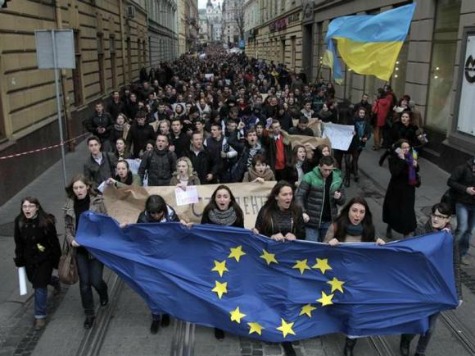European Union leaders this morning signed association agreements with three former Soviet bloc countries, Moldova, Georgia and Ukraine, leaving Moscow in no doubt that the EU is determined to continue its expansion eastward despite upheavals in Ukraine triggered by the agreement.
According to Ukraine’s President Petro Poroshenko, his country signing the association agreement underlines “its solemn choice of unification in the EU.”
The EU has already started pouring hundreds of millions of its €1.6bn (£1.3bn) financial assistance programme for Ukraine into Kiev, meant to persuade the country’s leadership to cooperate with Brussels’ plans to increase its influence in the former Soviet country.
The economic section of the agreement opens Ukrainian goods to the EU market and commits the country to economic and structural reforms. But it also moves the country closer towards EU membership, part of a relentless expansion across the Continent which is the long-standing policy of the unelected elite who drive the “European project.”
As Breitbart London reported in May the unelected president of the European Council, Herman Van Rompuy, warned Vladimir Putin that the EU intends ultimately to control every country on the western flank of Russia.
Van Rompuy, one of the signatories of the EU agreement with Ukraine this morning, told a Belgian newspaper that it was an “inspiring thought” that in the long term “the whole of European territory outside Russia” will be tied in some way to the EU.
Commenting on the agreements signed this morning, Alexei Makarkin, deputy director of the Centre of Political Technologies think tank in Moscow, told the Moscow Times: “Russia will react negatively to these signings not because of their economic nature, but because it views this as European expansionism into its traditional sphere of influence.”
“Big economic risks lie ahead,” according to the Russians news site, rt.com. “Signing the Free Trade Agreement will open up trade barriers between the former Soviet states.”
One unnamed Russian economist was quoted by the Moscow Times saying Russia would lose about €1bn in the next few years as a result of Ukraine’s signing of economic sections of the EU deal today.
Moscow fears that less expensive EU goods could flood into the Russian market via Ukraine, which has “beneficial” trade arrangements with Russia.
Goods manufactured in the cheap-labour French overseas territories such as French Guiana in South America and Martinique in the Caribbean, as well as in the Spanish North African enclaves of Ceuta and Melilla, count as “EU produced.” So do goods largely manufactured in China but assembled in factories in Italy and other EU countries.
“It is their sovereign right [to sign the agreement], but the Russian Federation will have to take measures in case it negatively effects the local market,” Dmitry Peskov, Putin’s spokesperson said.
If Russia were to protect its market by raising tariffs on Ukrainian imports, or even as some fear banning Ukrainian goods, this could deal a severe blow to the fragile Ukrainian economy. Despite aspirations by the Kiev government to closer ties with the EU and the increased trade benefits that could eventually bring, Russia remains its most important market.
However the overriding influence of the agreements will be political, not economic. One analyst told the Moscow Times: “The agreements’ greater impact on Russia is their erosion of Russia’s informal influence in former Soviet republics.”
The association agreement with Ukraine is described by the BBC as “slashing import tariffs with the EU” and committing the country to and “ambitious programme of political and economic reform.”
However, in a clause which the pro-EU BBC – which received €24.4m in grants from the EU between 2007-2012 according to research by Dr Richard North – does not headline, the full agreement also commits Ukraine to “explore the potential of military technological cooperation. Ukraine and the European Defence Agency (EDA) shall establish close contacts to discuss military capability improvement, including technological issues.”
Grigory Karasin, Russian deputy foreign minister, said “There is no doubt that the signing will have major consequences, but we should not make commonplace remarks but assess the implications in order to avoid all kinds of misunderstandings and suspicions,” according to the Financial Times.
The agreements come into effect once they are ratified by all 28 member states of the EU.

COMMENTS
Please let us know if you're having issues with commenting.